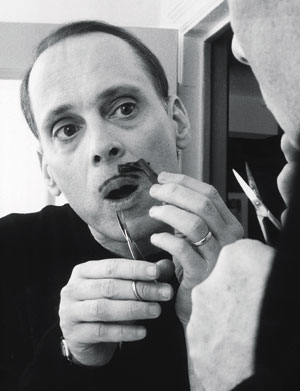WHAT PRICE HOLLYWOOD?
Cecil B. DeMented, a European-financed satire, in which John Waters merges his fascination with terrorism and Hollywood, is his funniest film in years. Here, novelist J.T. Leroy talks with Waters about Satanism, sex addicts, and the price of fame.
John Waters Photographed by Henny Garfunkel
Fame — its construction, deconstruction and ultimate absurdity — has long inspired the films of John Waters. From his earliest, Baltimore-produced no-budget classics like Desperate Living and Pink Flamingos, which created their own brand of stars out of Baltimore’s most eccentric characters, to such later comedies as Pecker and Serial Mom, which mixed new and old Hollywood royalty, Waters has had an eye for the cultural contradictions involved in becoming famous. In his latest film, Cecil B. DeMented, Waters delves into the divide between high and low culture, portraying the picture’s eponymous film director as an instant celebrity when he embraces terrorism as a means of changing the public’s filmgoing taste.
To interview Waters we asked writer J. T. Leroy, who is at the moment experiencing his own rush of sudden recognition. He’s been writing since he was 15, often under the pseudonym Terminator, but his first novel, Sarah, published by Bloomsbury, has inspired such cultural icons as Dennis Cooper, Mary Gaitskill and Lydia Lunch to sing its praises. (The book also received a rave review in the New York Times and just reached number 10 on the L.A. Times best-seller list.) Sarah is a transfixing, poetic and wildly imaginative picaresque of a 12-year-old boy who idolizes his mother, a truck-stop whore, and adopts her name and identity.
Leroy chatted with Waters by phone from his home in San Francisco. – S.M.
John Waters: Well, before we start, I want to say to you congratulations on your book. I had already gone out and bought it and read it before I even knew you were doing this interview. And boy, it was really good.
J.T. Leroy: Thank you, that means a lot.
Waters: Have you been doing interviews?
Leroy: Yes sir, yeah. It’s exhausting.
Waters: It is, I know. But it’s more exhausting when you put out a book and no one wants to talk to you.
Leroy: Yeah, something like that would be worse.
Waters: How old are you now?
Leroy: 20.
Waters: So you can’t really hang out yet. Oh you can, of course you can – you’re in San Francisco!
Leroy: [laughs] Most of the time. It doesn’t matter how fake my ID is – some places don’t care and some places look at me and they’re like, "Get out of here!"
Waters: Well, what’ll happen is, as soon as all these articles appear about you in the newspaper and they say how old you are, then you won’t be able to go out, because they’ll recognize you. That’s one of the bad things about fame – plus, you can’t get away with crime anymore!
Leroy: [laughs] Yeah. I’ve had to stop shoplifting.
Waters: Me too. Were you a good shoplifter?
Leroy: Yeah, I was very good.
Waters: I had a friend in San Francisco – and he was sort of famous, so I’m not going to say who it is – but he would go into department stores and set little fires, and the clerk would flip out and run over to the fire and then he would open the cash register and take all the money.
Leroy: Oh my god.
Waters: And he never got caught. It works, you should try it. No, don’t try it! But it does sort of work.
Leroy: Oh my god, that’s a good one.
Waters: What was the best thing you ever shoplifted?
Leroy: Well, I never did anything too big. I just used to go to these health food stores and get really good gifts for people. I used to give people olive oil.
Waters: [laughs] That’s good.
Leroy: Can I ask you about your movie? Cecil B. DeMented is really funny. I brought friends, and we just laughed a lot.
Waters: Thank you.
Leroy: So you wrote it and all?
 |
| Melanie Griffith in Cecil B. DeMented. Photo by Abbot Genser. |
Leroy: What were you arrested for?
Waters: For underage drinking. Have you ever been arrested?
Leroy: Yeah.
Waters: Besides shoplifting?
Leroy: Yeah. Oh yeah.
Waters: Well, I think that’s part of growing up, don’t you? [laughs] Have you ever been arrested in a movie theater?
Leroy: No sir, no. I’ve tried to keep my activities in movie theaters legal. But I’ve slept in movie theaters a lot.
Waters: Were they open? Or did you sneak in and stay when they were closed?
Leroy: When they would close I would try to stay in the bathrooms. I would sit on a seat with my feet up.
Waters: Were these porno theaters or regular theaters?
Leroy: Regular theaters. Pornos are used to it; they really check them out. Plus they’re too sticky and gross.
Waters: [laughs] Where was this? In San Francisco?
Leroy: In Los Angeles, Florida, Texas ...
Waters: You’ve gotten around.
Leroy: We lived in a car for a while.
Waters: I lived in my car, too [once]. I never slept in a movie theater, but I know of one in New York where a lot of people did because it was cheaper than a flop house. But if you [actually] fell asleep, you got raped or mugged.
Leroy: Did you like to go there?
Waters: Well, I mean, I saw it. But this was all before AIDS, so certainly there was – let’s just say – a lot more choices of nightclubs.
Leroy: Cecil B. DeMented cost around $10 million?
Waters: It cost, I think, $9.3 million.
Leroy: Were you nervous having that much money?
Waters: Well, no. I was nervous because I had that little money. Serial Mom cost $13 million. I know that sounds ridiculous compared to my first films that cost almost no money, but my [later films] are all done with full unions, the Screen Actors Guild and the teamsters. They are made just like regular Hollywood movies. And this was an action movie. I mean, we shot the whole movie in 31 days – which is short considering that it was pretty complicated. We shot Pecker in the same amount of time – and Pecker was just people talking. So I was nervous. But I understand how to you it seems like a huge amount of money, because when I made Pink Flamingos for $10,000 – which I guess today would probably be $75,000 – it seemed like a fortune. I had never had that much money then.
Leroy: One of my friends thought that people in Hollywood would be insulted by the film. But another friend and I think that they are going to find it really funny.
Waters: Well, so far, I think your other friend is right, because I got the money to make it all in France! When I tried to get this movie made in Hollywood, they all said no. And the Hollywood Reporter gave me a really, really mean review. There will be some people in the Hollywood movie industry that might not take it the right way, but to me, I’m making fun of something I like. I’m not serious about it! It’s a comedy. A political fantasy, basically.
Leroy: I really wanted your movie to have those things – like in Animal House – where it says, "so-and-so got married" at the end. I wanted to find out that maybe Melanie Griffith went to jail but also won an Oscar.
Waters: That’s the sequel! [laughs] So if I did that, you see, it would give it all away. What I think would happen is that Cecil really wouldn’t be dead – he would be severely burned like the person in Mask, and he would go to Paris and become a French director and would have to be saved by his cult. The two black kids would become very rich from the footage, which they’d sell to "20/20." And certainly Melanie Griffith’s character, Honey Whitlock, would have pleaded insanity, maybe even have been convicted, but for a short amount of time. It would be very good for her career, and she would be back working with all of the best of the new young independent film directors!
Leroy: [laughs] That’s good. And what would happen to Cherish?
Waters: Well, it looks like she’s dead, but maybe she could just have severe head injuries that would make her even hornier. And Petie’s in prison – so basically, he’d be the cutest boy on death row.
Leroy: It sounds like he’d be very happy there.
Waters: And Rodney, the heterosexual hairdresser, would still be dead – because all heteros that feel guilty have to be punished in my movies!
Leroy: That’s great! It is just the opposite of how Hollywood does it.
Waters: Well, you know, I go to colleges all the time and people tell me they’re gay, and some of them aren’t. I can see they’re not, they just want to be. And I have to tell them, "You have to come in, honey. Poor thing, you’re not gay." And they start crying, practically, they’re so guilty of their heterosexuality. In San Francisco I bet there’s a lot of that.
Leroy: Yeah. I think it’s kind of contagious here. I thought the recovered memory scene in the movie was the funniest. I’d go to AA meetings, right, and at first someone is just an alcoholic, and then after they’ve been in the program awhile, the next thing you know they’ve been molested by dingos.
Waters: And you get these doctors who are in a cult who believe in it and start saying yes, yes, that’s true, it happened, it happened. And so you believe you were molested by 65 witches and the entire Manson family.
Leroy: I also liked the scene in the movie where they’re burning themselves. I related, because I would do a lot of that stuff to myself.
 |
| Stephen Dorff in Cecil B. DeMented. Photo by Abbot Genser. |
Leroy: Everything.
Waters: Christina Ricci [cuts herself].
Leroy: So does the chick from Garbage.
Waters: Right, she just came out as a cutter. Did you stop doing it?
Leroy: Yeah. It’s a day at a time. This doctor at General actually offered to donate his services for plastic surgery.
Waters: Where did you cut yourself?
Leroy: On my stomach, anywhere that’s not visible in long pants.
Waters: I’m just curious, because I haven’t seen you, but do you have piercings?
Leroy: No.
Waters: Tattoos?
Leroy: No.
Waters: Oh, congrats. What a brave young person you are to not have gotten either one of those things. You’re really a nonconformist!
Leroy: I don’t know. I just didn’t want to call attention to myself. But in the hospital, because I have these markings, they brought in a special therapist to talk about Satanists ... I thought they were kidding, so I just made stuff up. They took it really seriously and got these people in there talking to me about it.
Waters: Did you ever know any real Satanists?
Leroy: No, just people who said they worship Satan.
Waters: Whenever I do book signings, if there are any little kids that have on "I Love Satan" T-shirts, I ask them to pose with me because I think they look cute, the little Satanists. The only one I ever met that was maybe real, I said, "What do Satanists eat?" And he said, "Their young." I thought that was a funny answer if you’re going to be one.
Leroy: Yeah, you’ve got to get the food chain right. Did you see Paradise Lost [The Child Murders at Robin Hood Hills, a 1996 documentary]?
Waters: Yes. But, you see, I’m in the minority. Sometimes I think [the three Arkansas teenagers controversially convicted of murdering three children] did do it.
Leroy: Noooo! There’s no way! Did you see the sequel?
Waters: Yeah, I did. And I still think they did it!
Leroy: No! There’s no way they could have.
Waters: I’ve met the directors [Joe Berlinger and Bruce Sinofsky], and they were so horrified when I said that to them. I don’t think they should have ever been convicted; I think there’s reasonable doubt. But I think it’s possible they did do it.
Leroy: It’s impossible. I mean, you saw that guy, the father?
Waters: I don’t know if he did it, either. He was an asshole, but there was no proof he did it. But it’s an incredible movie. Damien Wayne Echols really is in jail because of his hairdo! That can happen. Moore’s murderer, she’s on death row because of her hair, too – because she had that bleached blond hair and those roots. There are certain criminals that if they have an especially alarming fashion about them, they are punished because of it. Things like that definitely do not go over well with a jury.
Leroy: Was Cecil B. DeMented based at all on Patty Hearst?
Waters: Yeah, in some ways, certainly. I can’t deny that that was part of it. I would say Patty Hearst, Manson, Jim Jones, the People’s Temple, the flying saucer cult – all those kinds of cults were certainly an influence on the film. And the fact that they used to call me a cult director. It was stuff I just tried to make a joke about, to exaggerate it.
Leroy: How did you get hooked up with Melanie Griffith?
Waters: Did you see the Larry Clark movie she was in called Another Day in Paradise?
Leroy: I think I saw parts.
Waters: Did you see the part where she shoots up in her crotch and her neck?
Leroy: No, I guess I didn’t see that.
Waters: [laughs] Those scenes made me think she might go for this. I saw that she was taking chances with her career. And I like Melanie. I had met her before. I was in Something Wild, the Jonathan Demme movie; I played a used-car salesman, and I sell her a car. I met her another time at Pia Zadora’s birthday party. And again at the San Sebastian film festival. I just thought she could laugh at the idea of being a movie star. She has a sense of humor where so many of them don’t after being in show business for a couple of decades.
Leroy: You [once said] that the most un-American thing you could do is not want fame. I feel kind of un-American.
Waters: [laughs] And you’re getting it anyway because of this great book! But you’re lucky because the people who are book fans are generally smarter and more of the kind of people who you would want to recognize you.
Leroy: I love to get e-mails from people. That’s been the coolest thing.
Waters: I think your book would be a good movie.
Leroy: Well, I am working on the first draft of the screenplay with someone. But this Hollywood agent, she really tried to intimidate me, saying, "You can’t write the first draft. No one will buy it."
Waters: Bullshit. You have more of a chance to sell it if you do write it.
Leroy: She said a lot of stuff that – I felt she was using my age and my naiveté.
Waters: You don’t sound naive to me. First of all, just keep some control over it. If you write the screenplay – either just you or with someone else – it’s going to have some flavor. You should write it. Make sure it has your voice, not someone else’s.
Leroy: That’s why I really want to learn how to do it.
Waters: And who do you think should play your part?
Leroy: Russell Crowe.
Waters: [laughs] But he’s too old.
Leroy: Yeah, but he’s got some fine muscles. And I won’t ever have muscles like that. [laughs] Do you think some of those young folks in Cecil will be joining your troupe of regulars for the next movie?
Waters: We’ll see. I hope so. I’m writing this script about sex addicts.
Leroy: Are you going to any Sex Addicts Anonymous meetings?
Waters: Well, I certainly have done research on it. I didn’t go myself, but I have all the literature, and I’ve talked to a lot of people who have been to them. Have you ever been to one?
Leroy: Oh yeah.
Waters: It seems to me like it would be a good place to cruise for the people who fail.
Leroy: It’s a great place, actually! It really is. I’ll tell you, they have some of the funkiest- smelling chairs.
Waters: Well, after filming three days in a porno theater in Baltimore, which we did, you can get used to anything.
Leroy: I like the lines that people say you use when you are filming, like, "Look terrified, like you’ve just seen The Poseidon Adventure."
Waters: Did I say that?
Leroy: There is a guy in Baltimore who snuck on to your set. I went on his website, where he wrote some of the things he heard you say.
Waters: That’s probably true, then.
Leroy: People also say you reference a lot of your earlier movies [in Cecil].
Waters: You think? I’m sure I could have, but I don’t know of one obvious reference. Well, [it does remind some] people of Multiple Maniacs – remember when he’s running down the street and stopping in East Baltimore, only instead of homeless extras it’s Melanie Griffith? [laughs]
Leroy: It’s a really funny movie.
Waters: Thank you very much.
VOD CALENDAR


 See the VOD Calendar →
See the VOD Calendar →



